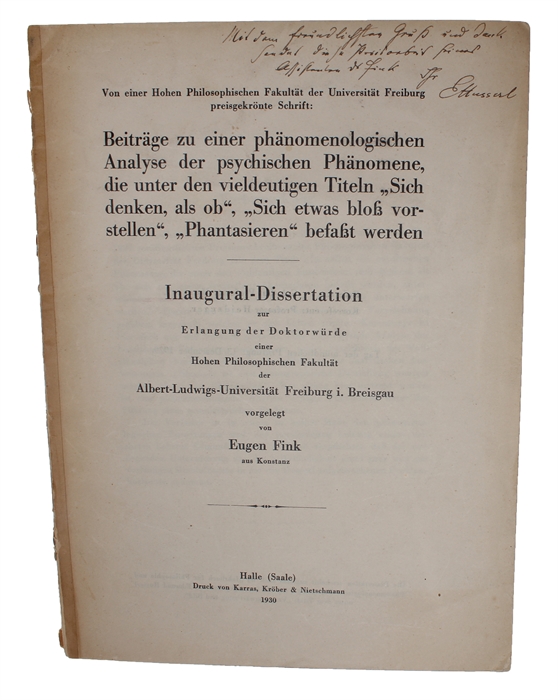PRESENTATION-COPY FROM HUSSERL
FINK, EUGEN.
[Von einer Hohen Philosophischen Fakultät der Universität Freiburg preisgekrönte Schrift:] Beiträge zu einer phänomenologischen Analyse der psychischen Phänomene, die undter den vieldeutigen Titeln "Sich denken, als ob", "Sich etwas bloss verstellen", "Phantasieren" befasst werden. Inaugural-Dissertation zur Erlangung der Doktorwürde.
Halle, 1930.
4to. Unbound, as issued, with the original paper backstrip. Spine a little loose. A very fine copy with only minor soiling. VI, 71 (also numbered (239)-309) pp. + 1 f. ("Lebenslauf").
Scarce first edition, offprint, with a 3-line presentation-inscription from Husserl (Signed "Ihr/ E Husserl") of Fink's inaugural price-dissertation, which also appeared in Husserl's "Jahrbuch für Philosophie und Phänomenologische Forschung" - there under the title "Vergegenwärtigung und Bild". This notorious dissertation was officially defended in front of Husserl and Heidegger and caused Fink to be chosen as Husserl's assistant.
The present copy encapsules one of the most important periods in the history of phenomenology - the 1930'ies is a period of turmoil in the great phenomenologists life, a period in which Husserl transforms many of his basic ideas, and Fink, Husserl's assistant and the person closest to observing this transformation, is the primary witness to this historical change.
"In the last decade of his life (from 1928 to 1938), Husserl sought to develop a new understanding of his transcendental phenomenology (in publications such as "Cartesian Meditations", "Formal and Transcendental Logic", and the "Crisis") in order to combat misconceptions of phenomenology then current (chief among which was Heidegger's hermeneutic phenomenology as articulated in "Being and Time"). During this period, Husserl had an assistant and collaborator, Eugen Fink, who sought not only to be midwife to the birth of Husserl's own ideas but who also wanted to mediate between Husserl and Heidegger. As a result of the Fink-Husserl collaboration there appeared a rich flow of works that testify to the depth with which transcendental phenomenology had been rethought." (Dermot Moran, Fink's Speculative Phenomenology: Between Constitution and Transcendence).
The important German philosopher Eugen Fink initially studied under Husserl in Freiburg, before he famously became his assistant. He counts as one of the most important representatives of phenomenological idealism and is famous for his definition of philosophical problems as "pre-questions" that lead, through ontological practice, to true philosophy.
"Eugen Fink was Edmund Husserl's research assistant during the last decade of the renowned phenomenologist's life, a period in which Husserl's philosophical ideas were radically recast." (R. Bruzina, Edmund Husserl and Eugen Fink. Beginnings and Ends in Phenomenology, 1928-1938).
Order-nr.: 51631

